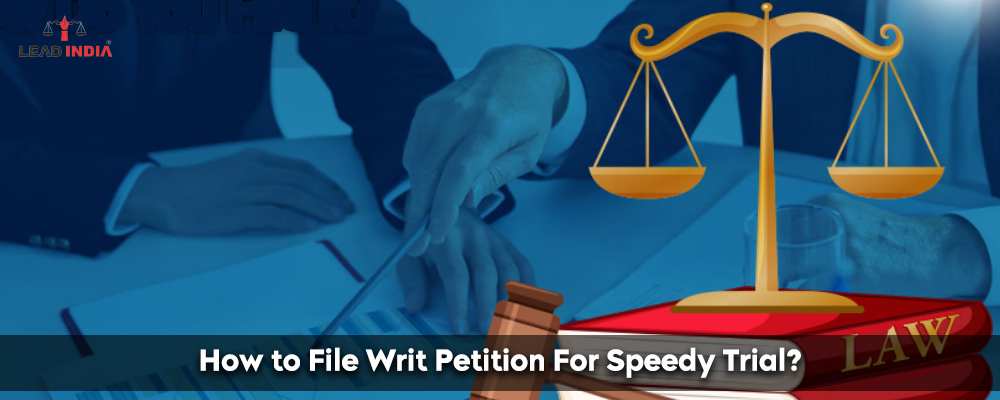Justice delayed can often be equal to justice denied in the maze-like system of law. A writ petition for a speedy trial is a possible option accessible to individuals looking for an immediate resolution regarding their legal disputes.
What is the Concept of Speedy Trial?
- When the state starts a process to take away someone’s life and liberty, one of the most important protections for that person’s rights is the right to a speedy trial.
- One of the main goals of the criminal delivery justice system is a speedy trial of criminal acts because a protracted delay can undermine justice.
Need A Legal Advice
The internet is not a lawyer and neither are you. Talk to a real lawyer about your legal issue

What is the Writ of Mandamus?
- The literal translation of the word mandamus is “we command.” A formal court order compelling a public official, government official, or lower court to fulfil a specific legal obligation is known as a writ of mandamus.
- It is a remedy available to ensure that public servants or entities abide by the law. Anybody who believes that a person, business, government, or lower court has infringed their right to carry out a public duty and who wishes to compel that party to comply may request a writ of mandamus from the Supreme Court or High Court.
Writ Petition for Speedy Trial: Grounds to File
The grounds to file a writ petition for speedy trial under the writ of mandamus are as follows:
- The respondent’s illegal or unconstitutional actions or their failure to conduct a speedy trial is what constitutes a violation of the respondent’s legal obligations if they are the government official or public authority serving as the respondent to the writ petition.
- The petitioner, who requested the writ for speedy trial, is being deprived of a legal right because of the respondent’s illegal activity or failure to conduct the speedy trial.
- After all other options have been exhausted, the petitioner of the writ petition has only one more option: the writ of mandamus. This allows the petitioner to protect their legal rights by filing a writ petition for speedy trial.
A writ petition of mandamus may be issued for speedy trial in addition to these general ones, such as when a public official or authority:
- fails to take appropriate action to safeguard citizens’ fundamental rights by conducting speedy trials.
- neglects to carry out a legal obligation or make a required action for a speedy trial.
- behaves in a biased or capricious way for conducting a speedy trial.
- neglects to take action to stop an impending threat to the environment or the general public by neglecting the speedy trial.
Writ Petition for Speedy Trial: Procedure to File the Writ
- First, the aggrieved party needs to go to a designated organization with the necessary documentation, which includes, among other things, photos, proof of identity, and proof of residency.
- Then, with legal assistance, the writ petition for speedy trial must be drafted. The name, address, and circumstances leading up to the aggrieved party’s rights being violated are all contained in the document.
- This procedure is followed by sending the petition’s draft to the court, which will then set a hearing date and accept the writ petition for speedy trial notifying the opposing party.
- Then, a date is given to guarantee the attendance of both parties.
- In the end, the court makes a determination and grants the necessary relief after hearing from both parties.
Writ Petition for Speedy Trial: Format
The writ petition for speedy trial format is provided below:
The main purposes of the writ of mandamus are to enforce legal requirements and hold public officials and employees accountable for neglecting the process of speedy trial. It serves as a legal defence for individuals and groups to defend their legal rights and challenge illegal or inaction on the part of the state.
For any type of legal assistance, one can talk to lawyer from Lead India. Lead India provides free online legal advice in India. With Lead India, one can ask free online questions of the experts in addition to getting free legal advice.





 Talk to a Lawyer
Talk to a Lawyer